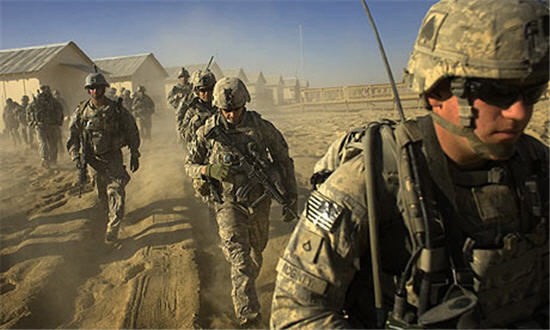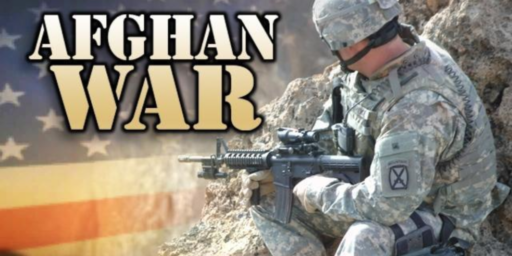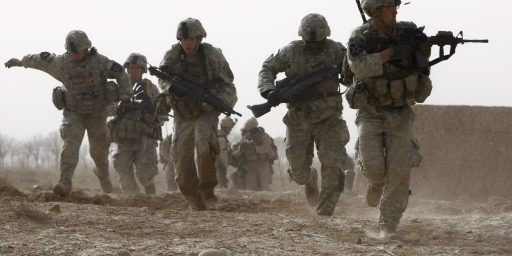What About Afghanistan?
The war in Afghanistan has not been a topic of discussion in the Presidential campaign, but that's largely because there's not much left to talk about.
PJ Media’s Myra Adams laments the fact that Afghanistan has gotten next to no attention from anyone in the Presidential campaign:
It is the War in Afghanistan and the question is: “Why in this election year is no one talking about the war and our mounting casualties?” Nothing, I repeat, nothing makes me angrier. So if this piece suddenly stops in mid-sentence kindly call 911 because it means I finally blew a gasket and here is why.
On Sunday morning we recorded ABC This Week with George Stephanopoulos. Near the end of the show, George typically posts on screen a list of our best and bravest military service members who have given their all during the past week in Afghanistan.
Yesterday’s segment included about 12 names of the deceased. Now predictably, every week it is at that point in the show when I spring off the couch, flee the room and yell: “I can not watch this, I can not look at their ages. Why are they dying? What are they dying for? Why are we still there? Why is no one talking about this?”
Will someone in Washington PLEASE try to answer these questions?
How about you folks in the mainstream media taking a short break from asking Mitt Romney to release this old tax returns and focus instead on asking our leaders about this drip drip drip of needless deaths? (For example, there were 36 in May, 42 in June, 29 in July and so far in August there have been at least 6.)
(…)
No one seems to know why we are still there. Perhaps that is why Obama and Romney, as well as officials in both parties running for reelection, are neglecting to mention the war in their campaign ads and speeches.
But every month it is drip drip drip, with more deaths and countless broken bodies and even more with Post-traumatic Stress Disorder (PTSD) which is a ticking time bomb from within.
None of this is really new, of course.
Eighteen months ago, I noted that the war in Afghanistan was receiving next to no coverage from the American news media. Indeed, the only time we seem to hear anything about the country is if a high government official is visiting the country or if something really bad happens like when a large number of American troops are killed, the incident earlier this year when an American soldier massacred fifteen Afghan civilians, or when some atrocity occurs. There is rarely any good news out of the war, and very little that is reported gives anyone any cause to think we’re accomplishing anything worthwhile. So it’s really not news that the Presidential campaign is ignoring Afghanistan because we’ve been ignoring Afghanistan for years now.
Another answer to the questions Adams poses is the simple fact that foreign policy in general isn’t getting much attention in the campaign to begin with. Outside of sometimes bizarre rhetoric from Mitt Romney, our relationship with Russia and China is not being discussed. The complex situation in the Middle East is, in Romney’s eyes, reduced to simplistic sound bites about moving our embassy to Jerusalem, saying that there shouldn’t be an inch of daylight between the United States and Israel, and promises from both candidates that they will stop Iran from gaining nuclear weapons without any explanation of exactly how they intend to do that (although with Romney, war seems to be the inevitable course of action). We’ve been in Afghanistan for ten years now, and I dare say that most Americans don’t really have a very good grasp of what the situation is on the ground there, so other than vague promises of “victory” there’s nothing either candidate can say that fits neatly in a 30 second commercial.
Third, it strikes me that most Americans don’t really want to hear very much about Afghanistan. For years now, polling has indicated that the public has soured on the war and wants American troops to leave the country as soon as possible. Back in March, support for the war itself hit an all-time low. More importantly, over the past year the President has outlined the plan for a draw down of troops that will have most if not all American troops out of the country by 2014. Most recently, he signed a new agreement with President Karzai that defines the relationship between the United States and Afghanistan going forward, and provides for the Afghans to take over most of the tasks being performed by American and NATO forces today. A month before that, the U.S. handed control of night raids over to Afghan authorities after complaints from civilians and the Afghan government over the practice.
The war is, in other words, winding down.
In some sense, one wonders what there is left to talk about. If President Obama is re-elected his withdrawal plan will most definitely go forward. If Mitt Romney is elected, it strikes me that it will be hard for him to reverse course on the plan Obama has put in place. For one thing, major elements of the withdrawal will already have occurred before he took office, and once troops are gone it’s unlikely that they’ll be coming back. For another, the Afghans are unlikely to agree to give back on the hand over of control issues once we’re a year away from the the 2014 withdrawal date. Perhaps we do need to have a discussion about how much we want to commit to the country after 2014, but on the basic questions of the war itself, and the ones that Adams asks, the questions have already been answered and the plan has been set on course. the American people overwhelmingly support the President’s draw down plan. What’s left for the candidates to debate?







It is a sad commentary that an ongoing shooting war has all but disappeared from the public’s consciousness. All part and parcel of the big slide.
I think there’s still plenty left to debate. What precisely is each candidate’s plan for the conflict? No platitudes allowed, what are the specifics? Was the conflict worth it? Is it still worth it? What are the specific lessons they’ve drawn from it? How does it impact their approach to committing in the future our military forces to combat? How does it inform our relations with our NATO allies? What does it say about the future of NATO? Probably several other germane questions that I’ve missed.
You have to be realistic about these things. Who is dying in Afghanistan? Its the poor and the working class. To put it bluntly, the people dying there aren’t attorneys, college professors, or the children of attorneys or college professors. If middle class kids were dying over there, we would hear a lot more about the Afghan War.
It would be great to hear Romney and Obama offer some broader discussion of what to do about failed states. The traditional fixes – such as foreign aid and peacekeeping missions – often do little to address core problems of state decay.
Unfortunately, too many politicians and citizens wrongly believe that a new framework for fixing failed states must necessarily be expensive. In the looming US age of austerity, and given public polling on foreign aid, it is no surprise that neither Romney or Obama want to wade into a global discussion of state failure.
Everyone knows Afghanistan is gonna go to hell as soon as we pull out, but we’re sick of the place and are pulling out anyways. The American public doesn’t want its faces rubbed in that, and both Romney and Obama knows they’re likely to become enraged at anyone who brings it up.
Romney really can’t talk about it. If he gets more hawkish than Obama he alienates the voters and if he gets less hawkish he alienates the cons.
Doug nailed it. There really isn’t anything left to talk about. There’s already a drawdown plan and you can’t really just drawdown a war instantly. Tsar has some good questions about the type of introspection that should be done by the media, but as far as going foward with the war, there isn’t really much to change. It’s sort of like Iraq in 2008. What was going to happen was already set, the only difference between the candidates was rhetorical.
Nobody Here at OTB want’s to talk about it – 6 comments, pathetic. Americans are dyeing there for nothing folks and nobody want’s to talk about it. It’s no surprise that the politicians don’t want to talk about it but were not politicians.
@Ron Beasley: I think that the fact that “Americans are dying there for nothing” is precisely why no one wants to talk about it.
I’ve been reading every single name of every single dead service member every single week for over ten god damned years. It started as some sort of sense of duty, I suppose (I initially supported the invasion of Afghanistan), then as a bitter pill to swallow (I was very much against the invasion of Iraq) but now it’s just a . . . I don’t know. Some sort of futile exercise in responsibility? A weekly reminder to myself that mistakes have irrevocable consequences? (Who will be the last person to die for a mistake?) Whatever it is, I can’t allow myself to stop reading them — and I have to be honest: it’s kind of soul crushing. It can still make me literally weep with shame and grief. Ten years!
So in a way, I can sympathize with those who would prefer to let their eyes skip over any headline with “Afghanistan” (or “Iraq”) in it. The phrase “outrage fatigue” may have started as a tongue-in-cheek joke, but it has a real truth to it: there’s only so much you can hold in your heart.